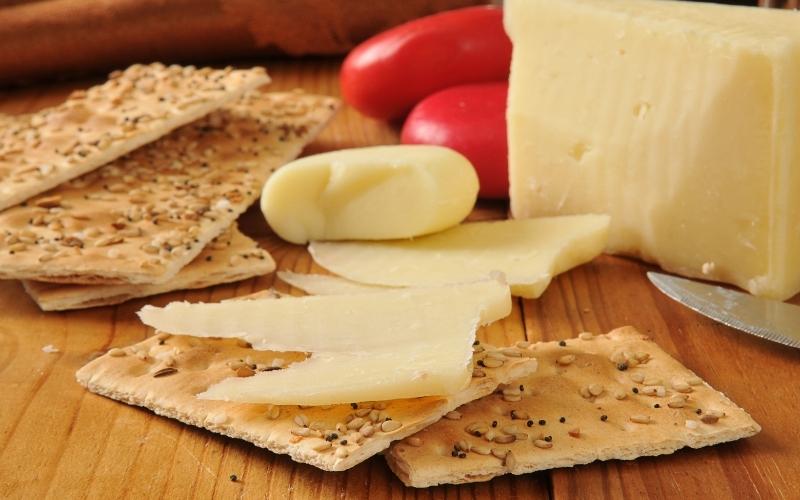Gouda cheese is one of the most popular cheeses worldwide, so it's not a surprise that more and more people what to learn about it: what it tastes like, how it’s best used, how to store it, etc.
And today, we’ll be answering the most frequently asked questions about it, so anyone interesting can learn what they need to know about Gouda without spending extra time googling each question individually.
If you’re already an advanced Gouda connoisseur, you likely already know the answers to these questions and should go visit Yummy Bazaar’s online cheese store and check out our Gouda assortment.
As for the rest, let’s cut to the chase and begin!
 What is Gouda Cheese?
What is Gouda Cheese?
Gouda is a semi-hard cow milk cheese that originated in the Netherlands. It’s traditionally made in large flat wheels in flat wheels of 10 to 12 pounds and aged from 4 weeks (young cheese) up to 36 months (very old cheese). Depending on how long it was aged, gouda can range from pale ivory color and smooth buttery texture to dark golden color with gritty and crumbly, parmesan-like texture.
Gouda can either be regular or smoked, with smoked gouda cheese having a creamier texture and more robust flavor.
One of the oldest and most famous European cheeses, Gouda and Gouda-like cheeses, are produced worldwide, with German, France, and Italy being the most prominent markets after the Netherlands. However, several varieties: Boerenkaas, Noord-Hollandse Gouda, and Gouda Holland, have been given Protected Geographical Indications (PGI) and can only be made in the Netherlands with milk from Dutch cows.
What is Gouda Cheese Taste Like?
Young gouda has a smooth, mild, creamy, and somewhat sweet flavor. The longer it’s aged, the more complex that flavor gets, with earthy, nutty, and caramelly notes becoming more and more pronounced. Fully aged gouda (aged for more than 10 months) has a rich taste with strong sweet undertones reminiscent of butterscotch.
Smoked gouda cheese has a more buttery, nuttier, and sweeter flavor with distinct smoky undertones (no surprise there).
 Is Gouda Cheese Salty?
Is Gouda Cheese Salty?
Gouda cheese is moderately salty. As with other similar cheeses, the flavor of younger cheeses is milder, and the longer it's aged, the sharper (and saltier) it gets.
Is Gouda Supposed to Smell?
It depends on what you mean by smell. Gouda cheese does have a distinct aroma, characteristic of most semi-hard cheeses: it’s buttery, a bit earthy, and a little nutty. Nothing that’ll turn heads from a distance, but quite noticeable if you bring it close to the face.
If gouda cheese emits a strong, pungent aroma, it's likely spoilt. If you open the package and you’re hit with an unpleasantly sour smell, either discard it immediately or contact the manufacturer.
 How to Cut Gouda Cheese? Do You Cut the Rind off Gouda?
How to Cut Gouda Cheese? Do You Cut the Rind off Gouda?
Gouda cheese often has two rinds: the wax one and the natural one under it. The wax one is always supposed to be cut away. The natural rind is perfectly edible, but most people don’t enjoy the hard and gritty texture and cut it away as well.
Cutting gouda in triangle slices is the most popular way to serve it (if you’re buying a wedge of cheese, not the slices). You can start by cutting away the wax (the preferred way, especially if you’re supposed to serve the cheese to guests), or you can divest each slice of it in the end (better, when you only need a few slices).
Cut the wedge of cheese horizontally into two or three parts (depends on what size you want your slices to be), and then slice each wedge into triangles.
Or you can just slice the entire block into thin rectangles without spending extra time and effort. That’s common too.
How Do You Eat Gouda Cheese? What Do You Eat Gouda With?
Gouda is one of the most versatile cheeses. It goes well with both sweet (fruits, jams, honey) and savory (cured meats, nuts, olives) ingredients. This versatility makes it one of the go-to cheeses for any charcuterie board or cheese plate.
At the same time, while gouda is well-enjoyed raw, it also holds up fantastically in more complex dishes, both meat and vegetable-based. It’s easy to cook with as long as the other ingredients in the dish are strongly flavored themselves and don’t run a risk of being overpowered by gouda. Even when the recipe calls for different cheeses, gouda is typically one of the go-to substitutes for most of them due to these qualities.
 What Meat Goes with Gouda Cheese?
What Meat Goes with Gouda Cheese?
Since gouda cheese is so robustly flavored, it pairs best with other intense flavors that won’t get overwhelmed by it.
Among cured meats, the spicy or smoky ones like chorizo, pepperoni, salami Piccante, salchichon, soppressata, prosciutto Cotto, etc.
If you’re using gouda for a meat-based dish, it’ll work best with pork and beef, particularly BBQ. Poultry and fish might get overpowered, so better avoid it if possible.
What Jam Goes with Gouda Cheese?
Same as with meats, you need intense flavors to pair with gouda. Among sweet preserves, fig jam, plum jam, raspberry jam, and zesty citrus marmalade like orange and lemon work best. Among savory ones, bacon jam and pepper jam can work great.
 Can You Melt Gouda Cheese?
Can You Melt Gouda Cheese?
It depends on how long the gouda has been aged. How well cheese melts depends on its moisture content, and Young, Young Matured, and Matured Gouda (aged no longer than 18 weeks) all have enough moisture content to melt well.
Young cheese melts at 130°F in just a few minutes, with Mature cheese taking maybe around 15. Remember that melting gouda at a high temperature will cause it to become stringy, so better go low and slow.
Smoked gouda cheese maintains its melting qualities: unlike aging, smoking doesn’t affect how melty it is, so younger, semi-soft smoked gouda cheese melts just as well as a non-smoked one.
Is Gouda Good for Grilled Cheese?
Adding gouda to a grilled cheese sandwich is one of the best ways to utilize it. It’s due to the acidity level! Gouda cheese has an acidity level in the range of pH 5.3 to 5.5, which is considered ideal for sandwiches. These cheeses melt well, but they don’t go too liquidy, and they don’t break down unevenly, forming clumps - giving the chef the time to grill the sandwich for long enough to heat through and attain proper golden color.
 Is Gouda Cheese Good on Pizza?
Is Gouda Cheese Good on Pizza?
Due to its great melting qualities, gouda is an excellent substitute for mozzarella on a pizza - but its sharper, more robust flavor isn’t as universal a fit with all toppings as mozzarella. Stick to strongly flavored toppings for gouda cheese pizza like pepperoni, pulled pork, or smoky BBQ, and skip milder ones like prosciutto or poultry.
Oh, and it’s a great addition to any Quattro Formaggi (4-cheese) pizza!
Is Gouda Cheese Good on Burgers?
Absolutely! Smoked gouda cheese, especially, goes fantastic with the robust beef flavor. More flavorful the burger, the better it pairs with gouda due to its distinct and strong taste. Smoky BBQ flavor makes a perfect pair, as mentioned above, so swap ketchup for BBQ sauce if you have it laying around.
 Why is Gouda Cheese Wrapped in Wax? How Do You Remove Wax from Gouda Cheese?
Why is Gouda Cheese Wrapped in Wax? How Do You Remove Wax from Gouda Cheese?
Wax sealing is a common technique in cheese manufacturing, notably when it comes to semi-hard cheeses like Gouda or Edam. Dipping in wax helps with preserving the correct moisture content in the cheese while it ages, preventing oxygen from getting in. This type of aging is called the anaerobic method. In contrast, natural and washed rind cheeses are aged through the aerobic method: absorbing oxygen during the process.
You can easily cut the wax away with a knife or use a vegetable peeler not to waste any extra amount of cheese. You can even peel it away by hand after cutting the cheese, though this will take more effort and time.
How Long is Unopened Gouda Cheese Good For?
Most commercially produced cheeses will have a best-by or expiration date printed on the label, so simply checking the date and sticking to it is an easy solution. Hard and semi-hard Dutch cheeses like Gouda and Edam are usually sold with a storage time of two to three months (however, the time stamp differs by the manufacturer, so stick to the label).
On the other hand, if you’re buying artisanal cheese at a cheese shop that doesn’t come with labels, you should treat it the same way you treat commercially packaged gouda that has been removed from its package.
 How Long Does Gouda Cheese Last Once Opened?
How Long Does Gouda Cheese Last Once Opened?
Once opened, Gouda cheese is best consumed within two weeks after package removal. It may stay fresh for longer, but most health professionals advise against unnecessary risks. If you’re feeling daring, make sure there have been no changes in smell, texture, and visuals before consuming the leftovers. If you have too much left, better stay on the safe side and freeze the cheese.
How Long Can Gouda Sit Out?
According to the FDA guidelines, perishable items can sit out for 2 to 3 hours at room temperature without going bad. After that, you shouldn’t take risks even if the visuals, smell, and taste of the item in question remain the same.
This standard changes in extreme temperatures and according to humidity levels. Things spoil faster in case of high temperature and high humidity, while cold and dry temperatures may keep it stable for longer than 3 hours.
In the case of hard and semi-hard cheeses, they can comfortably sit out even past that standard. After an evening on a charcuterie board, gouda likely won’t have any bacterial growth, even with noticeable changes in the texture (it’ll dry out and become more brittle).
 How Do You Store Gouda Cheese (in the Fridge)?
How Do You Store Gouda Cheese (in the Fridge)?
Either place the gouda in a resealable plastic bag or wrap it either in wax paper or parchment paper before storing it in the fridge. It will keep the flavor and texture of the cheese better by preventing it from drying out. If your fridge has a specialized dairy drawer, keep it there. Otherwise, it’ll last best in a vegetable crisper, where the temperature is cool and stable.
Is it OK to Freeze Gouda Cheese? Does Cheese Lose Flavor When Frozen?
Yes, you can freeze gouda cheese. Most natural cheeses, gouda included, can be frozen without detriment to their flavor. However, keep in mind that freezing and thawing influence the cheese texture.
While cheeses with semi-hard and hard textures fare better after being thawed than soft ones like camembert, gorgonzola, or chevre, they might not be as good for raw consumption as before freezing. Freezing removes moisture, and the thawed cheese will be harder, crumblier, and more mealy.
The best way to utilize frozen cheese is to stick it into a dish instead of on a charcuterie board. Melted, it’ll taste just as good, and textural changes won’t be noticeable.
To better preserve gouda cheese in the freezer, wrap it in parchment paper or wax paper, same as with the refrigerator. If you’re freezing slices, place a piece of parchment between each individual slice so they aren’t stuck together, and you have an easier time separating the exact amount you need when the time comes.
Freezing will increase the shelf life of gouda cheese by approximately 2 months.

